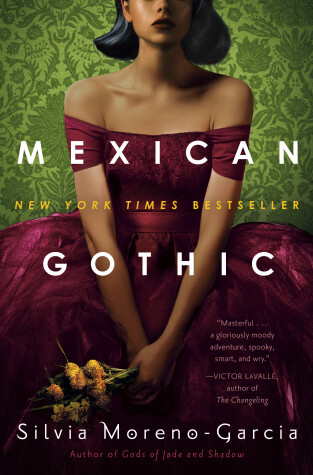Reviewed by nannah on
Content warnings:
- incest
- racism
- eugenics!
- sexual assault (graphic)
- drugging
Representation:
- the protagonist and her cousin are Mexican and indigenous
Noemí, socialite and flirt, receives a letter from her cousin begging for help and saying she hears voices in the walls of her new husband’s house. When Noemí arrives at High Place, her cousin’s new English family are inhospitable, save for the patriarch, whose interest in her is racist and fetishistic, and the younger son, who might prove to be her only ally in the search for what is turning her once cheerful cousin listless and ill.
I really enjoyed this one! Every character felt very distinct, as did the setting, which transported me to a place I could clearly imagine. I didn’t always like the protagonist, but I loved that she so clearly stood out from other characters I’ve read recently (especially the ones who exist to spout a moral. Don’t get me wrong, I love works of fiction that have something to say, but they should present stories and characters first). The writing overall was strong, although at times it could be inconsistent, with passages reading very awkwardly.
The book isn’t science fiction, but it’s almost written like one. By that, I mean it feels like Moreno-Garcia approached the book not from within the more rigid barriers of historical fiction, but from within the almost limitless taps of possibility that sci-fi allows. It’s cool to see that writers are looking at the new discoveries in science (and, okay, I know that they aren’t all that new by now) and applying it to the past, rather than just the future. We don’t always have to go to outer space to find things we’d think of as “alien”--but Moreno-Garcia makes the mycelium work here just as well as any alien in a sci-fi thriller that I’ve ever read.
I also really love that she incorporated the “mestizo” issue into the story. A couple months ago I heard the finer details of the issue from an indigenous friend for the first time, and I remember wishing more people outside of Mexico knew the awful history of the word. When Spain and England colonized the area now known as Mexico, they mixed with the indigenous populations. These people of mixed heritage had been called “mestizos” to separate them from the Spanish and the English (and the rest of the indigenous population). They were of lower social standing than the whites, but stood higher than the indigenous people. My friend said there were those who considered them to be a superior race, or products of whites experimenting to find a superior race (like the patriarch hints at in the novel).
This book is told by someone who is "mestizo". While I can’t really comment on how well any of this is done, I do love how the author incorporates the issue. It’s never preachy, and the plot always comes first.
All in all, this was a wholly absorbing read. I loved the slower pace, especially. It was like stepping in muck, becoming slowly engulfed in the atmosphere and setting, being slowly pulled into the deteriorating mental state of the MC. I didn't want to stop reading.
Okay, so … after reading a few reviews, I’m disappointed that so many people found the reason behind the cousin’s condition cheesy. Even if they know about mycelium being the network of forests, and how mycelium work in general! Because that’s what makes the story believable! To each their own, I guess.
Reading updates
- Started reading
- 16 November, 2022: Finished reading
- 16 November, 2022: Reviewed
